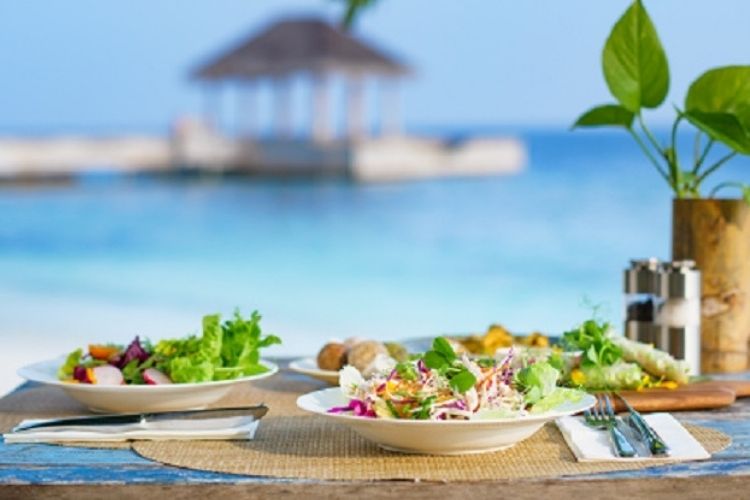Amilla Maldives Resort and Residences is celebrating after winning the Wellness Cuisine of the Year 2021 prize in the prestigious Destination Deluxe Awards. The five-star Maldives resort also came third place in the Hotel of the Year 2021 category and was a finalist in Eco-Hotel of the Year 2021 and Spa of the Year 2021.
The Wellness Cuisine of the Year 2021 accolade was bestowed upon Amilla Maldives in recognition of the resort’s trailblazing Wellness Your Way (WYW) programme. Although Amilla is not a wellness resort, General Manager, Jason Kruse, and Sustainability and Wellness Mentor, Victoria Kruse, recognized that a truly contemporary five-star resort should fully cater to all the dietary requirements of its guests – not only for those with food intolerances but also for those who follow ‘eating lifestyles’. So Victoria devised a series of WYW menus encompassing a variety of keto/paleo/low carb, gluten-free, dairy-free and vegan/vegetarian dishes.
Every dish at the resort can also be customised to each guest’s precise desires, and all the staff at every single one of Amilla’s restaurants have been educated about dietary preferences and intolerances or allergies. This helps to ensure they offer accurate advice to guests and requests for alterations are always greeted with understanding.
This project has been a labour of love for us. We personally follow our own path to wellness through a ketogenic diet and we want to ensure that any guests coming to Amilla can do the same. We want it to be effortless on the part of the guests, as well as delicious to continue – or even start – an eating lifestyle at Amilla.
Victoria Kruse, Sustainability and Wellness Mentor at Amilla Maldives
Amilla’s innovative Wellness Your Way programme, thought to offer the widest variety of speciality dishes in the Maldives, is complemented by two additional wellness cuisine programmes (also the brainchild of Victoria) – Homemade@Amilla and Homemade@Amilla.
The Homegrown@Amilla initiative sees many different types of products grown in the surprisingly fertile soil of the island, including sweet potatoes, herbs, bananas, lettuce and mushrooms – fresh eggs also come from the resort’s new ‘Cluckingham Palace’ coop.
Homemade@Amilla utilises many of the Homegrown products plucked from the resort’s new fruit and veg gardens, as well as items from neighbouring islands and beyond, to create Homemade@Amilla kefir, kimchi, yoghurt and more.
The Destination Deluxe Awards are highly revered in the travel industry as they feature a professional judging panel of 18, with no payments accepted from competitors for tables or to be part of the awards ceremony. Competition is fierce for these much-desired awards.
We are so grateful to win this award. As a boutique five-star Maldivian-owned resort, we are so grateful to Destination Deluxe to have been selected. I can not express how much this means to our team and how much additional motivation it gives us to continue upon our journey. After all the challenges of COVID, reopening during the pandemic and being a stand-alone property, we are so grateful to receive such an award. We really value the award as we know it is ‘real’.
Jason Kruse, General Manager at Amilla Maldives







